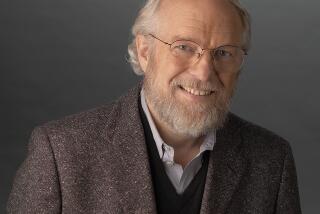THE CUTTING EDGE: COMPUTING / TECHNOLOGY / INNOVATION : REPORTER’S NOTEBOOK : PC Whiz Kids Grapple With Age and Change : Conference: Innovators wonder if the Internet will make powerful desktop computers obsolete.
- Share via
SCOTTSDALE, Ariz. — The personal computer industry has always been a young person’s game, played by men and women in their 20s and 30s who fomented a technological revolution in garages and spare bedrooms. But now they’re turning middle-aged, and their once-a-year pow-wow, the Agenda Conference, is feeling a bit like the nerd’s version of gatherings at the Bohemian Grove, where the once-powerful and the now over-the-hill are all trying to persuade one another other that they still matter.
The bars at the posh Phoenician Resort here have been remarkably quiet as attendees hurry to their hotel rooms after dinner to tuck in the children. The all-night jam sessions of computer-entrepreneurs-by-day, amateur-musicians-by-night are a thing of the past. The bigger bashes of recent conferences have been group birthday parties for those turning 40.
“There’s a certain amount of angst in our industry,” admitted pundit Stewart Alsop, organizer of the conference. “We’re getting older . . . and the pace of change has picked up.”
The question weighing heavily on the minds of the 400-plus Agenda attendees is whether their aging legs will allow them to stay in a race that’s now run in the shadow of the Internet computer network. The arcane but passionate technical debates about graphics standards and competing operating systems that dominated previous gatherings have quieted. Those subjects are no longer relevant.
Instead, the PC cognoscenti must cope in a world in which bandwidth--the ability to pipe information from the Internet quickly into a home or office--is more important than how quickly a PC can run a spreadsheet.
Lawrence Ellison, the controversial founder and chief executive of Oracle Corp., voiced what many here fear most. “The next generation of computer is a network appliance,” Ellison maintained. “The PC is a ridiculous device. It was designed to stand alone . . . and they are much too complicated and expensive.
“PCs should cost about $500 . . . and I want to be able to install it like my TV--just plug it in,” he added.
About a third of the attendees, like Ellison, subscribed to futurist George Gilder’s theory that tomorrow’s PCs will be nothing more than receptacles for information. (“No longer will the programs in your machine determine the functions you can perform,” he says. “The network is the computer. The computer becomes peripheral to the Internet.”) Another third held to the belief that Gilder’s is an extreme view. And the remainder seemed to hope he is wrong, but fear he is right.
Just where attendees stood on this question depended, as always, on where they and their companies are sitting in the market. “The PC has only just entered its adolescence,” maintained Eckhard Pfeiffer, chief executive officer for Compaq Computer Corp. “The PC seems to be in a perpetual state of metamorphosis . . . it’s a telephone, a fax, a television.”
He conceded, though, that “there’s going to be a very different device than today’s PC; something with two-way communications, that will accept voice commands; something so small that you’ll wear it on your belt. We are working on it in every possible way.”
Sun Microsystems, which got its start making desktop computer for engineers and scientists, is remaking itself as an Internet company with a programming tool called Hot Java that enables the creation of interactive content for the World Wide Web.
“I was frustrated that Sun wasn’t doing new things,” said Eric Schmidt, the company’s chief technology officer. “We had some technology lying around that had potential for the Internet.”
A few of the industry’s veterans have genuinely remade themselves. Silicon Graphics founder James Clark has teamed with 24-year-old Marc Andreessen to launch cutting edge Internet company Netscape Communications. And Jean-Louis Gassee, the onetime vice president of research and development for Apple Computer Inc., has assembled a dozen computer programmers--average age 27--in his new venture Be Inc.
Be’s operating system dazzled Agenda attendees with state-of-the-art multimedia. It received a standing ovation. “In Italian, the word impresario means entrepreneur,” said Gassee, 51. “I like that definition. At this stage in my life, I’m supposed to get the talent and manage it in a way that we sing well together.”





